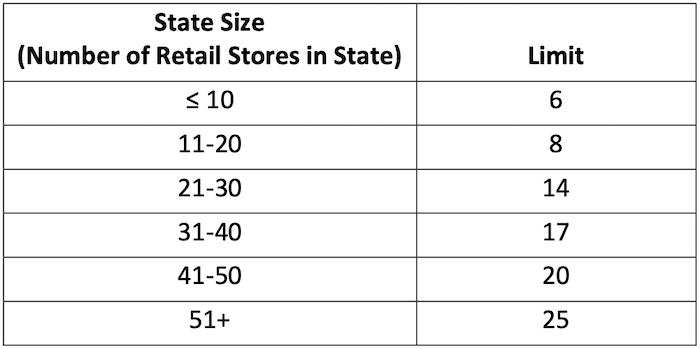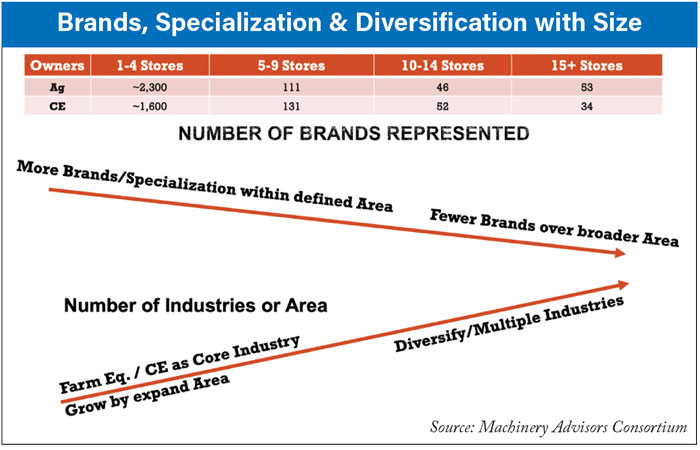Updated: 06/18/2024
Ag Equipment Intelligence (AEI) broke the story, “Kubota Limits Number of Stores Owners Can Own Per State” in an “AEI Overheard” item in the May 15 edition of the AEI newsletter. The official announcement was released 2 days later and was covered again with dealers’ reaction as the lead story on AEI’s May 24 On The Record broadcast.
Kubota’s memo explained that dealer store locations would be capped starting at 6 in states with 10 or fewer Kubota locations up to 25 stores per ownership group in states with 51 or more Kubota stores. Nationally, the number of Kubota locations any one ownership group can own is now 50.
The 2024 Big Dealer Report from AEI showed 4 Kubota dealerships with 10 or more Kubota ag equipment stores in the U.S.: Florida Coast Equipment (13 stores in Florida), Bingham Equipment (12 stores in Arizona and California), Crystal Tractor & Equipment (11 stores in Florida) and River Valley Tractor (10 stores in Arizona and Texas). Texas has a notable number of big Kubota dealers, including WCTractor, Ewald Kubota and Lansdowne-Moody. The Big Dealer Report shows 1,195 total Kubota ag stores in North America.
Since AEI’s initial coverage at the end of May, editors reached out to several industry officials for context on what it could mean for the industry. The North American Equipment Dealers Assn. officers were contacted several times but ultimately declined to comment due to sensitivities over manufacturer and dealer contact reviews.
Following are a few items of note since AEI’s last coverage.
Backdrop for Change
One Kubota dealer concluded that Kubota saw its old agreement’s “holes” that were going to be further exploited by a private equity group — one he said aimed to buy out the best territories and had made promises to dealer-principals about future growth opportunities.
“This policy, if Kubota adheres to it, will ensure that those growth plans aren’t going to come to fruition.”
George Russell, of Machinery Advisors Consortium, offered some context of what is spurring change in manufacturers’ agreements (see chart on p. 1). “Dealers want to get their hands on as much geography as possible,” he said.
“There are two types of expansion in the OEM-dealer dynamic, and the tension is around the number of brands represented vs. the area. OEMs typically want dealers to focus on their brand and to cover a wide area, if they are well represented, meaning high market share.
“Dealers who want to grow can do so by adding more area and/or more lines. The latter, however, creates tension.”
He went on to say customers of production-ag and full-line construction equipment — where Kubota is increasingly staking its claim — are highly sophisticated and work over wide areas. These customers benefit most from more service locations and specialization. While he said the dealers and OEMs of the compact equipment benefit less from geographic scale, the OEMs still want a fewer or singular brand-focus, especially as they add products to serve those customers.
“That’s what I see in Kubota’s decision,” Russell said. “Their dealers have more lines to sell and Kubota, rightly, wants their dealers to focus on their entire product line. I also observe that Kubota wants the ‘local and close-to-you’ feel with their dealers. This may be why they limit size.
“The tension with some dealers is that it removes their opportunity to grow, and to reduce in-line competition. It offers choice to the customer, however.”
Dealers’ View
Steve Hunt, president of H&R Agri-Power, a CNH and Kubota dealer headquartered in Hopkinsville, Ky., said the news will handcuff the best dealers from growing as they’ll wonder whether they should try to expand their business.
“You want people to survive in this business. It will be harder to do that if you handcuff your dealers. I hate to see OEMs trying to limit capitalism, but I understand the control and the concern if a dealer got to be 25% of Kubota’s business and went belly up. It’s a slippery slope. I expect the other OEMs to do it, too.”
Several other dealers would only comment “off the record.”
One Midwestern dealer exec pointed to the broader question of what he and his partners have discussed, namely how it could hinder 2 strong dual-branded dealers to merge if the combined location title exceeds the 50% requirement. “We’re limited if we want to leverage the experience and knowledge of another group with our common primary line. The probability of a major brand to go along with us and Kubota is going to decline rapidly. And it may decrease the value of our dealership if a buyer knows there could be more reluctance from not only Kubota but the dealer’s other major lines.”
Every major OEM is tasked with strengthening its network, he said, and the majors will do that by more aggressively pushing their line with the dealership or expect drops of any competing lines.
Another Deere dealer found the location-capping a surprise. And, like Hunt, he was concerned how it might impact other ag OEMs as the balance of power shifts. He expects the OEMs to “reevaluate their distribution strategies, partnerships and overall presence within each state to adapt to the changing dealer landscape. That could cause OEMs to find alternative ways to reach customers and maintain market share in the affected region.”
Additional Information: Click here for the “AEI List” on Kubota Dealers in the U.S.
05/24/24 3:40 PM CST
Farm Equipment has received responses from several dealers regarding Kubota's new acquisition policy.
One Kubota dealer said:
It kind of handcuffs your best dealers from growing. Then why are you going to want to drive forward and try to grow your business? I understand the issues there possibly if it gets too big. But you want people to survive in business. And it could be harder and harder to do that if you handcuff dealers like that. Not good.
I just hate to see OEMs trying to limit capitalism quite truthfully, but I understand the control and the concern. Because if those dealers got to be 25% of Kubota's business and they went belly up, what happens to Kubota? So I understand that on the flip side.
One John Deere dealer said:
The strategy to cap the number of locations is a surprising move. One that might possibly impact other OEMs in the agricultural industry as it could shift the balance of power among dealerships and manufacturers.
It may also lead to OEMs needing to reevaluate their distribution strategies, partnerships, and overall presence within each state to adapt to the changing dealer landscape, resulting in OEMs needing to find alternative ways to reach customers and maintain market share in the affected region. Only time will tell. Then again, it may be the greatest strategy ever.
For additional commentary, check out the latest episode of On The Record.
Kubota has implemented a new policy effective May 17, 2024, that will cap the number of Kubota locations any dealer can own per state. According to a memo sent to dealers May 17, Kubota is setting these limitations "to maintain the integrity of our dealer network, support the Local Dealer of Choice philosophy, and promote transparency through the growth process."
News of the coming policy was first covered by Ag Equipment Intelligence on on May 15.
Some of the purposes given in the memo for the new policy included:
- "promote healthy intra-brand balance and maintain a strong market presence on a state and national level – all for the benefit of Kubota customers."
- "Over concentration within a designated geographical area can leave our dealer network, customers, and overall market representation vulnerable with a sudden change in ownership, market/brand focus, or overall community image."
- "maintain the integrity of the dealer network and continue have a favorable mix of high performing single and multiple location entities."
The following table is included in the memo outlining limitations per dealership group depending on how many total Kubota retail stores that state has:

The policy additionally limits the number of total Kubota locations one ownership group can own to 50 nationwide.
Kubota provided the following statement on the to Ag Equipment Intelligence on May 14:
Kubota Tractor Corporation continuously evaluates its dealer network to ensure Kubota dealers are positioned as the local dealer of choice in every community by providing the best product selection, pricing, and overall experience for existing and prospective Kubota customers. To foster healthy competition in the industry, Kubota is in favor of a balanced approach which allows for managed growth by dealer owners, while also requiring reasonable limits on the concentration of ownership at a state level. Our dealers will be the first to learn of any further developments on this matter.







